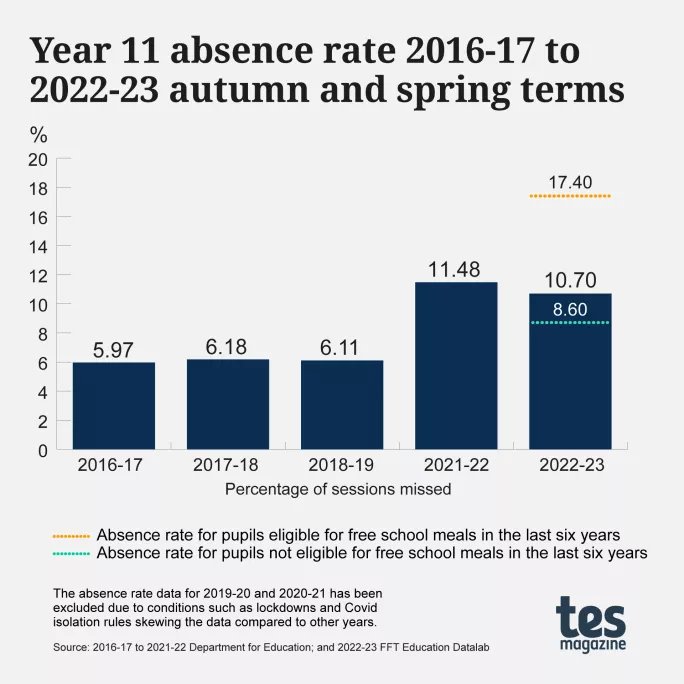GCSEs 2023: Grading fears amid high exam student absence

Fears have been raised over the plan to return GCSE grade standards to pre-pandemic levels as new Tes analysis reveals that exam student absence is still 75 per cent higher than before the Covid lockdowns.
Year 11 students missed 10.7 per cent of sessions - with each session being equivalent to half a day at school - over the autumn and spring terms this academic year. This was a 75 per cent higher absence rate than in the pre-Covid 2018-19 academic year, according to Department for Education and FFT Education Datalab data analysed by Tes.
The absence rate among disadvantaged Year 11 students who will sit their GCSE exams this summer is more than double that of their peers.
Former schools minister Robin Walker, who is chair of the Commons Education Select Committee, said the findings on overall absence rates among exam students, and in particular the“differential level of absence for disadvantaged pupils”, is a “grave concern” and needs to be addressed as a “priority” by the government.
- GCSEs 2023: Invigilator shortage fears as student anxiety spikes
- School attendance: What’s gone wrong and how can we fix it?
- Robin Walker: DfE persistent absence data delay “disappointing”
The absence rate for the current Year 11s was 10.7 per cent of sessions across the autumn and spring term combined, according to FFT data.
This means the amount of school missed by exam students so far this year is 75 per cent higher than in 2018-2019, when the absence rate stood at 6.11 per cent for the two terms.
The analysis comes as schools brace themselves for a return to pre-pandemic grading in 2023, although exam regulator Ofqual has promised “some protection against any impact of Covid disruption” to learning.

And figures shared with Tes by FFT reveal that disadvantaged students are missing more than twice as much school (17.4 per cent of sessions) as their peers (8.6 per cent) so far this year.
Mr Walker said the numbers revealed by Tes are “concerning”, particularly given the “big drive on attendance” by the government.
“Certainly the objective was that we should be returning to much more normal levels by now. And clearly that isn’t the case,” he added.
GCSE exams: High absence among Year 11 students
The Commons Education Select Committee is currently investigating the causes of persistent absence in schools, as well as possible solutions.
Mr Walker said he wants to see “more urgency” from the DfE in addressing the problems with absence that are perpetuating post-Covid, adding that the concern “comes into sharp focus when you’re talking about” exam-year students.
And he thinks that the continuing problems with absence should be taken into account when looking at students’ exam results.
Rob McDonough, CEO of the East Midlands Education Trust, told Tes that while Ofqual had made the decision to return to pre-pandemic grading levels, attendance, behaviour and levels of attainment reported by headteachers in his trust are “still very much in a recovery period”.
He added: “Ofqual need to be reflective of the circumstances and challenges still facing schools.”
And while schools are working hard to get back to normality, Mr McDonough warned that he was “unsure when we will get there”, with his trust seeing “particular issues with secondary students who were in years 5 and 6 when the pandemic began” and are yet to begin GCSE courses.
Commenting on the continuing higher absence in Year 11, Wayne Norrie, CEO of Greenwood Academies Trust, said that when Ofqual made the decision back in September to return to pre-pandemic grading, the watchdog “couldn’t have anticipated absence” being so high this year.
Mr Norrie wants the DfE to acknowledge the difficulties that schools are facing, as well as an “understanding” that the sector is not at “the tail end of the pandemic” and is still very much ”dealing with the aftermath”.
Mr Norrie is also particularly concerned about the “disproportionate” impacts on disadvantaged students.
The children’s commissioner, Dame Rachel de Souza, is also worried about absence among Year 11 students and the impact this could have on their GCSE results, Tes understands.
Mr Walker said that pupil absence in the past had been “difficult and challenging to shift”.
“It’s not something that you can just flick a switch and do overnight. So obviously, that is a real concern when it really has an impact on children’s long-term chances,” he added.
Glyn Potts, headteacher at Blessed John Henry Newman RC College in Oldham, said he felt that it was “wrong” for Ofqual to return to pre-pandemic grading but added that the decision was “made with good intent”.
He said the sector “didn’t imagine” that absence would continue to be so high this year.
Lee Elliot-Major, professor of social mobility at the University of Exeter, told Tes that the challenges of high absence in schools ”will take years to address and could impact on a whole generation of pupils taking exams this year”.
Mr Elliot-Major said it seemed “unfair” that much of the policy debate focused on earlier exam students who sat their assessments during the pandemic, ”when the effects are still clearly impacting on current pupils”.
Meanwhile, Tim Oates, group director of assessment research and development at Cambridge Assessment, said that the impact of Covid ”will linger for successive groups of students for years to come” and it is something that Cambridge is monitoring.
He added that the sector “must remain vigilant to supporting and monitoring student progression - especially those most affected by Covid disruption - and acting in a targeted manner as we handle learning gaps”.
A Department for Education spokesperson said:
“Attendance rates since the pandemic have improved and the vast majority of children are now in school and learning. We are aware that higher rates of illness absence this year has impacted on overall absence.
“We will continue to work closely with schools, trusts, governing bodies, and local authorities to identify pupils who are at risk of becoming, or who are persistently absent and support them to return to regular and consistent education.”
You need a Tes subscription to read this article
Subscribe now to read this article and get other subscriber-only content:
- Unlimited access to all Tes magazine content
- Exclusive subscriber-only stories
- Award-winning email newsletters
Already a subscriber? Log in
You need a subscription to read this article
Subscribe now to read this article and get other subscriber-only content, including:
- Unlimited access to all Tes magazine content
- Exclusive subscriber-only stories
- Award-winning email newsletters
topics in this article



